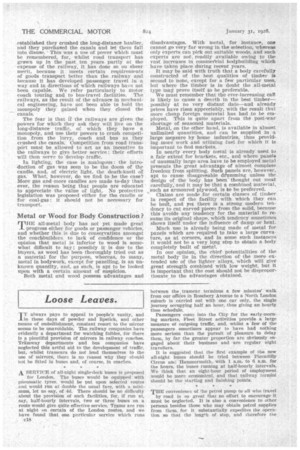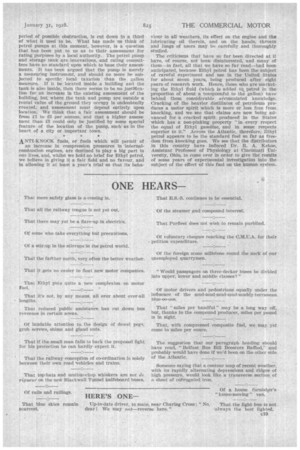Loose Leaves.
Page 40

Page 41

If you've noticed an error in this article please click here to report it so we can fix it.
IT always pays to appeal to people's vanity, and in these days of powder and lipstick., and other means of embellishment, constant resort to the mirror seems to be unavoidable. The railway companies have evidently a department for watching foibles, for there is a plentiful provision of mirrors In railway coaches. Tramway departments and bus companies have neglected this artful aid to the development of traffic, but, .whilst tramcars do not lend themselves to the use of mirrors, there is no reason why they should not be fitted in buses and, of course, in coaches.
A SERVICE of all-night single-deck buses is proposed for London. The buses would be equipped with pneumatic tyres, would be put upon selected routes and would run at double the usual fare, with a minimum, let us say, of 4d. There should be no difficulty abdut the provision of such facilities, for, if run at, say, half-hourly intervals, two or three buses on a route would give quite effective service. Trams are run at night on certain of the London routes, and we have found that one particular service which runs , c18
between the tramcar terminus a few minutes' walk from our offices in Rosebery Avenue to a North London suburb is carried out with one car only, the single journey occupying half an hour, thus giving an hourly time schedule.
Passengers come into the City for the early-morning markets, Fleet Street activities provide a large measure of outgoing traffic, and, whilst a few of the passengers sometimes appear to have had nothing more serious than the pursuit of pleasure to delay them, by far the greater proportion are obviously engaged about their business and are regular night travellers.
It is suggested that the first example of the new all-night buses should be tried between Piccadilly Circus an 'Hammersmith. with 1 a.m. to 6 a.m. for the hours, the buses running at half-hourly intervals. We think that an eight-hour period of employment would be more economical, and that railway termini should be the starting and finishing points.
THE convenience of the petrol pump to all who travel
by road is Sa great that no effort to encourage it must be neglected. It is also a convenience to other persons besides those who may obtain petrol supplies from them, for it substantially expedites the_operation so that the length of stop, and therefore the
period of possible obstruction, is cut down to a third of what it used to be. What has made us think of petrol pumps at this moment, however, is a question that has been put to us as to their assessment for rating purposes by a local authority. The petrol pump and storage tank are innovations, and rating committees have no standard upon which to base their assessments. It has been argued that the pump is merely a measuring instrument, and should no more he subjected to specific local taxation than the gallon measure. If it be located inside a building and the tank is also inside, then there seems to be no justiCcation for an increase in the existing assessment of the building, but where the tank and pump are outside a rental value of the ground they occupy is undoubtedly created, and assessment must depend entirely upon location. We think that a fair assessment should be from 11 to £3 per .annuni, and that a higher assessment than 13 could only be justified by some special feature of the location of the pump, such as in the heart of a city or important town.
ANTI-KNOCK fuels, or fuels which will permit of an increase in compression pressures in internalcombustion engines, are destined to play a big part in our lives, and, whilst we hold no brief for Ethyl petrol, we believe in giving it a fair field and no favour, and in allowing it at least a year's trial so that its beha
viour in all weathers, its effect on the engine and the lubricating oil therein, and On the hands, throats and lungs of users may be carefully and thoroughly studied.
The criticisms that have so far been directed at it have, of course, not been disinterested, and many of them—in fact, all that we have so far read—had been anticipated, because Ethyl petrol has been the subject of careful experiment and use in the United States for about seven years, being produced after eight years of research work. Hence, those who are marketing the Ethyl fluid (which is added to petrol in the proportion of about a teaspoonful to the gallon) have behind them considerable ae-cumulated knowledge. Cracking of the heavier distillates of petroleum produces a motor spirit which is more or less free from knocking, and we see that claims are now being advanced for a cracked spirit produced in the States which has a non-pinking property ".in every respect the equal of Ethyl gasoline, and in some respects superior to it." Across the Atlantic, therefore, Ethyl petrol appears to be the standard fuel so far as freedom from knocking goes. We see that the distributors in this country have induced Dr. It, A. Kehoe, Assistant Professor of Physiology at Cincinnati University, Ohio, to come over in order tngive the results of some years of experimental investigation into the subject of the effect of this fuel on the human system.












































































































